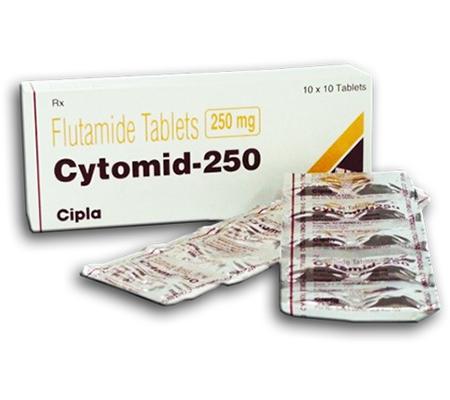Cytomid is an oral antiandrogen medication prescribed to treat men who are suffering from advanced prostate cancer. It operates by reducing the action of androgens which are associated with the growth of tumours in the prostate. This allows other procedures to be performed to remove or eliminate any remaining cancer cells. Your doctor may prescribe it for the treatment of other unlisted conditions, as well.
Cytomid should be used strictly according to your doctor`s instructions to get the safest and most effective results from treatment. The typical dosage is one tablet administered each day, but your individual directions will be based on your age, weight, health condition, and the severity of your symptoms. These doses should be swallowed whole and unaltered and may be taken with or without food, although a snack or meal is recommended before use if you get an upset stomach. Never change the form of the tablets by splitting or crushing them to avoid unintentionally destroying or altering the effects of their contents. Ask your doctor or pharmacist any questions you have about the medicine to ensure the correct usage.
Side effects associated with the use of Cytomid include: Upset stomach or diarrhoea; Hot flashes or increased sweating; Mild skin rashes; Greenish or slight discolouration of the urine; Swelling or discomfort of the breast area; Rectal inflammation or bleeding; Decreased sex drive, impotence, or trouble having an orgasm.
Stop using Cytomid and contact your doctor as soon as possible if you experience any worrying symptoms being especially cautious about signs of an allergic reaction such as hives, severe rashes, swelling, or trouble breathing. These conditions may require lower doses, reduced frequency of administration, or emergency medical attention in serious cases to prevent further health problems from occurring.
Cytomid should not be administered to patients who are women, children, or who have porphyrias. Also inform your doctor if you have a G6PD deficiency, heart disease, or reduced liver or kidney function as these conditions may cause unexpected complications requiring adjustments to your regimen.
Strictly use Cytomid as prescribed and follow all instructions provided by your doctor. Safe, suitable, and optimum dosage can vary and is dependent on the patient`s health and medical history, as well as the condition you are treating.
Cytomid may not be safe or suitable for all patients. Always ensure your doctor is informed if you are pregnant or breastfeeding, using any other type of medication (including non-prescription medicine, vitamins, and supplements), as well as if you have any allergies, other illnesses, or pre-existing medication conditions.
Seek immediate medical attention or proceed to your nearest accident and emergency department if you suffer a hypersensitive or allergic reaction. Symptoms usually present during a reaction of this nature include difficulty breathing or swallowing, swelling of the limbs or face, tight chest, hives, and skin rashes.






